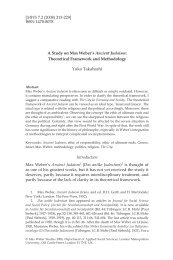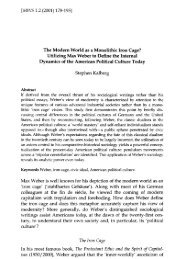Disenchantment, Enchantment and Re ... - Max Weber Studies
Disenchantment, Enchantment and Re ... - Max Weber Studies
Disenchantment, Enchantment and Re ... - Max Weber Studies
You also want an ePaper? Increase the reach of your titles
YUMPU automatically turns print PDFs into web optimized ePapers that Google loves.
24 <strong>Max</strong> <strong>Weber</strong> <strong>Studies</strong><br />
‘The extending irrationalities of our time’: that is, I suppose, one attitude—<strong>and</strong><br />
indeed a widely held attitude—to the enchantment <strong>and</strong> reenchantment<br />
that is this article’s theme. <strong>Re</strong>gardless of its actual timing—at<br />
the beginning or the end of the year 2000—the Millennium is<br />
upon us as I write. We are in its midst. If anything, its likely social<br />
significance <strong>and</strong> cultural importance have increased since Raymond<br />
Williams wrote the above (if only because of the massive, almost<br />
unprecedented, sense of anti-climax that attended the dawn of 1<br />
January 2000). From the viewpoint of the here <strong>and</strong> now, however—<br />
from one or other side of the Millennial threshold—we can actually<br />
assume less than Williams could. There is a need to begin by asking,<br />
what is the Millennium?<br />
The first thing to note is that the Millennium has been a social<br />
phenomenon of considerable diversity, complexity, <strong>and</strong> duration: not<br />
one thing, but many. We should not expect that they will all fit easily<br />
together. In other words, although the usage is too well established to<br />
dispense with at this late stage, to talk about the Millennium is, in<br />
important senses, somewhat misleading. Nor did ‘it’ arrive suddenly<br />
<strong>and</strong> punctually, as the clocks in our local time zones struck the appropriate<br />
midnight, <strong>and</strong> nor will it depart precisely twelve months later.<br />
The Millennium had already been upon us, for years in some respects,<br />
long before the first fireworks. As a ‘chronological’ event, its indeterminacy<br />
betrays its social construction. It is many-faceted <strong>and</strong> difficult<br />
to pin down.<br />
‘The’ Millennium has, for example, been a major focus of rationalized<br />
activity in its own right. It became both subject <strong>and</strong> object of a<br />
vast amount of organizational effort <strong>and</strong> coordination by international<br />
organizations, governments, organized capitalism <strong>and</strong> voluntary<br />
organizations. There has been administration, bureaucracy, policy<br />
formulation <strong>and</strong> implementation, <strong>and</strong> planning: in a word, rationalization.<br />
Money has had to be made, catastrophes averted, contingencies<br />
allowed for, popular enthusiasm managed, <strong>and</strong> so on.<br />
The Millennium has also been a catalyst or focus, in itself, for political<br />
controversy <strong>and</strong> activity. In Britain, for example, voices were<br />
raised in public about the plans for the Millennium Dome at Greenwich,<br />
<strong>and</strong> the exhibitions it would house, long before it opened. Several<br />
themes relevant to this discussion were visible in these conflicts:<br />
the relationship between the sacred <strong>and</strong> the secular or the profane;<br />
the relationship between the resident <strong>and</strong> established enchantment—<br />
Christianity—<strong>and</strong> recent interlopers in the shape of the faiths <strong>and</strong><br />
beliefs of modern multi-ethnic British society. This was perhaps best<br />
encapsulated in the Archbishop of Canterbury’s threat, as the head of




